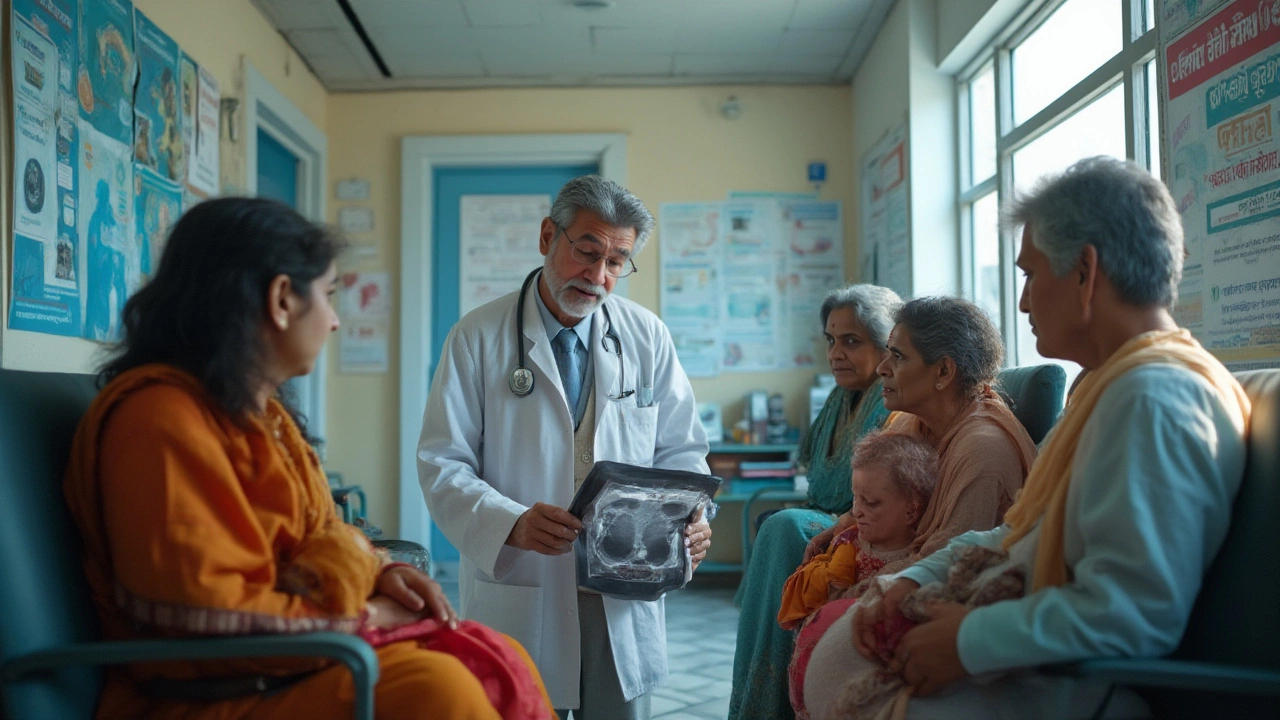If you’ve ever heard someone say “they didn’t even know they were sick,” and then a few months later, there’s a funeral, you’re probably dealing with the type of cancer that doesn’t mess around. And if we’re talking about speed—the kind that leaves no time to react—pancreatic cancer almost always snatches the podium. It’s like the stealth bomber of the cancer world: arrives quietly, does its damage, and barely gives anyone time to prepare a counterattack. The numbers are cold, the facts are sharper than you’d expect, and the stories behind those numbers are everywhere—maybe in your neighborhood, maybe in your own family.
Why Pancreatic Cancer Tops the “Fastest Killing” List
So what sets pancreatic cancer apart from its equally unwelcome peers? For starters, the pancreas hangs out deep inside your belly, tucked behind the stomach. Most types of cancer make some noise with symptoms early on, waving little flags to say something’s off. Not pancreatic cancer. The symptoms—think back pain, weight loss, or a bit of yellowing in the eyes—could be passed off as stress, a minor infection, or just a bad week. By the time it’s loud enough to grab your attention, it’s usually late to the party.
Here’s a jaw-dropper: according to global stats from the World Health Organization (WHO) and the American Cancer Society, out of every 100 people diagnosed, only about 12 will be alive five years later. Now look at this table—that tells you just how deadly it is compared to the most common cancers:
| Cancer Type | 5-Year Survival Rate (%) | Estimated Annual Deaths (worldwide) |
|---|---|---|
| Pancreatic Cancer | 12 | 500,000+ |
| Lung Cancer | 21 | 1,800,000+ |
| Colorectal Cancer | 63 | 935,000+ |
| Breast Cancer | 91 | 685,000+ |
| Prostate Cancer | 97 | 375,000+ |
What’s brutal about pancreatic cancer is how fast things progress. Some people feel okay at the beginning of the year, but might not make it to the next one. When I was reading up on this stuff for a friend whose uncle was diagnosed, I realized the clock ticks faster than anyone expects. The silent spread is mainly because the pancreas is surrounded by thick tissue and organs—by the time a tumor causes trouble, it’s already grown big or even spread elsewhere.
A few other reasons keep pancreatic cancer at the top:
- Blood vessels feeding the digestive tract are right next to the pancreas, so cancer cells can slip out fast.
- Chemo and radiation don’t work as well, since the tissue is tough for drugs to reach.
- Most people don’t realize they’re at risk—no simple screening tests like for colon or breast cancer.
Ever heard of Steve Jobs or Alex Trebek? Both famous faces who fought the disease, and even with the best doctors in the world, pancreatic cancer was almost impossible to beat for more than a couple of years. The point is, even with all our knowledge and technology, this is one cancer where medicine is still catching up.
Panic or Prepare? Recognizing Symptoms and Risk Factors
You might feel a little paranoid reading this, but panic doesn’t help—being informed does. The scary part is that symptoms usually don’t announce themselves until the tumor is large or has spread, which is why the death rate is so high. Here’s what people need to watch for, even if these things seem unrelated:
- Mysterious, unplanned weight loss that keeps going.
- Upper belly or back pain—nagging, and not relieved by the usual painkillers.
- Jaundice (yellowing of skin or eyes) without an obvious cause, like hepatitis.
- Loss of appetite, or feeling full after just a few bites.
- Newly developed diabetes in adults, especially if not overweight.
- Dark urine and pale stools, which usually comes with jaundice.
Let’s talk risk factors. You can’t control everything, but knowing this stuff nudges you in the right direction. The biggest things that add up:
- Age – Most diagnoses happen over 65, but it does hit younger folks sometimes.
- Smoking – Smokers are twice as likely to get it compared to non-smokers.
- Family history – Having more than one family member with pancreatic cancer puts you at high risk.
- Chronic pancreatitis – More common in people who drink a lot or have certain genetic conditions.
- Obesity and poor diet – Diet heavy in red/processed meats can nudge up your risk.
- Diabetes – Especially if new and you’re not overweight or genetically prone to it.
When you put it in a list, it almost looks like a bingo card for modern life. I know a guy—a regular, middle-aged office worker—who had never smoked and ate pretty healthy, but his dad and aunt both died of it, and sure enough, he got diagnosed last fall. Genetics sometimes roll the dice in a way you can’t control, but lifestyle still plays a role. In my family, my wife Anjali is the food police. She insists we eat more veggies and less processed stuff—sometimes I grumble, but seeing real data like this forces you to take those nag-nudges more seriously.
If you’ve checked off any two or more risk factors, or your gut says something’s not right, find a doctor who will listen. Early diagnosis is the difference between hope and heartbreak, especially with something as sneaky as pancreatic cancer.

Survival Statistics: The Numbers & The Realities
Sometimes numbers are the harshest language. Here’s what you’re really up against if you (or someone you love) hears those words: “You have pancreatic cancer.” Most people are diagnosed at stage III or IV—meaning the cancer’s already advanced. Check out some actual statistics, updated for 2025:
| Stage at Diagnosis | Percentage of Cases | 5-Year Survival Rate (%) |
|---|---|---|
| Stage I (Localized) | 10 | 39 |
| Stage II (Spread to nearby tissues) | 11 | 17 |
| Stage III (Lymph nodes involved) | 29 | 7 |
| Stage IV (Distant spread) | 50 | 2 |
Half get diagnosed when the cancer already reached distant parts of the body—think liver, lungs, or even bones. Treatments at this point are more about stretching time and less about a cure. If someone is lucky enough to catch it early (less than 1 in 10 patients!), and surgery is possible, survival rates jump way up, but that’s the unicorn scenario.
Here’s something that’s stuck with me: Of all major cancers, pancreatic gets the smallest chunk of research funding compared to how deadly it is. In 2023, it only got around 2% of global cancer research dollars, according to the World Pancreatic Cancer Coalition. That’s partly because the numbers don’t seem huge—the annual cases aren’t as high as lung or breast cancer. But when you talk about how fast it kills, and how little progress has happened in the past 50 years, it feels like more money should be flowing there by now.
One reason the survival rate is so stubborn is that the tumors adapt fast. They grow in a tangled mess of scar-like tissue (fibrosis), confusing both immune cells and treatments. Recent studies show that many of these cancers have genetic mutations that shut down the immune system’s normal alarm bells. This is why immunotherapy—the miracle for a few other cancers—barely moves the needle for pancreatic so far. Researchers are now trying to “reprogram” the stroma (think: the scar tissue matrix) to make it more vulnerable. If they crack that code, things could finally move forward.
I get asked: “What about those stories you hear of people surviving for years?” They do happen. There are outliers. Usually, these are folks who got surgery when it was still possible, plus chemo and maybe a clinical trial thrown in. But realistically, breakthroughs are still in slow motion compared to other cancers.
Early Detection, Treatments, and Lifestyle Choices
If the key word so far has been “speed,” here’s your best bet for cheating the odds: don’t wait. There’s no standard screening tool for pancreatic cancer—not like mammograms for breast or colonoscopies for colon cancer—but if you’ve got more than one family member with it, talk to a genetic counselor or specialist. They sometimes use MRI or endoscopic ultrasound to scan high-risk folks, and researchers are hustling to create better blood tests or “liquid biopsies” that flag cancers way earlier. As of this year, a new test picking up on DNA mutations in the blood is showing promise in clinical trials. It’s not perfect, but it could be available in big hospitals by 2026.
If you draw the short straw and get diagnosed, here’s the roadmap:
- If the tumor is small and hasn’t spread, surgery to remove the pancreas (or part of it) is the best bet. This is followed by strong chemo—and sometimes, radiation.
- For those with advanced disease, targeted therapies and newer chemo combinations can buy more time and quality of life.
- Clinical trials—these are increasingly important. New drugs, gene-targeted therapies, and immune-boosting treatments are in the pipeline. If your doctor doesn’t mention ongoing trials, ask about them yourself—there are websites that list them, country by country.
- Palliative care makes a big difference. Managing pain, digestion issues, and the emotional earthquake that comes with the diagnosis should never be skipped.
Here’s where daily choices come in. No, you can’t out-run genetics. But you can stack the odds your way in a few real ways:
- Stop smoking or don’t start.
- Eat a diet full of fruits, vegetables, and fiber. Go easy on red meats and processed foods.
- Keep a healthy weight—a large European study from 2022 found that obesity increases the risk by around 20%.
- Limit alcohol to avoid chronic pancreatitis.
- Stay physically active. Even 30 minutes of brisk walking most days seems to help.
- Treat diabetes well and have regular checkups.
Catching the disease early is like finding a needle in a haystack—but if you’re weirdly tired, losing weight without trying, looking a bit yellowish, or just “off” for weeks without explanation, demand answers. Better to annoy your doctor a little than end up a statistic. Anjali gets annoyed because I’m the king of ignoring aches and pains, but after researching pancreatic cancer for this piece, I might actually listen to her more often.
If your family tree has a few warning branches—maybe an aunt on one side, a grandfather on the other—don’t shrug it off or keep silent. Share the knowledge, push for screening, and ask those uncomfortable questions. Just staying alert might mean you, or someone you love, gets a chance to fight back—before the clock runs out.
